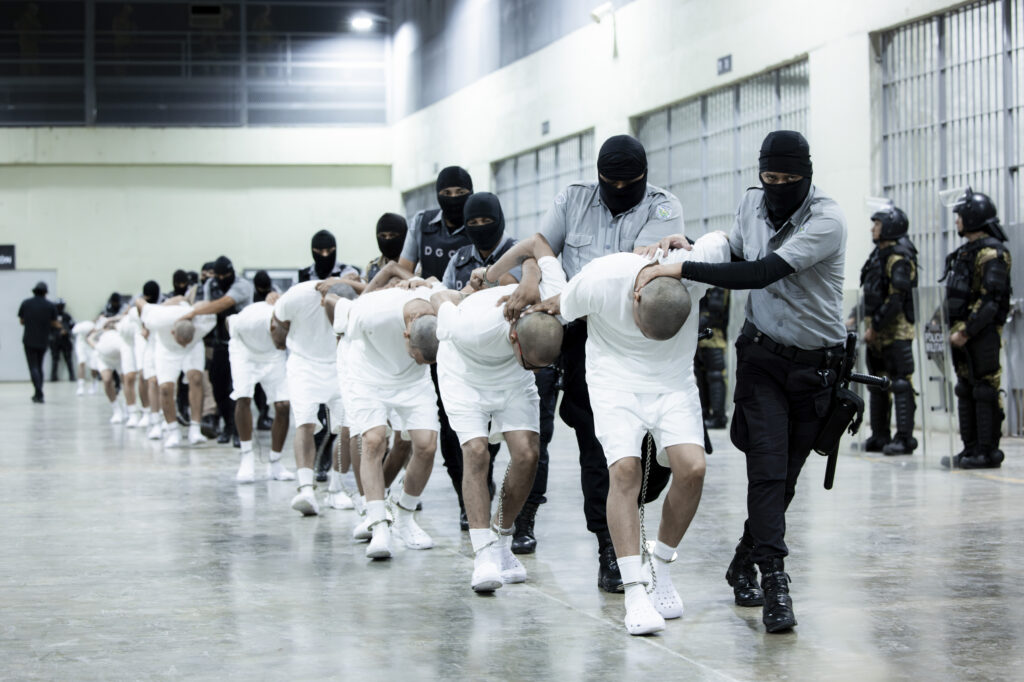El Salvador Contradicts Trump, Says It Has No Authority Over Migrants Held in Megaprison

El Salvador told the United Nations that it has no legal authority over hundreds of Venezuelan men that President Donald Trump sent to a Salvadoran megaprison earlier this year.
Over 200 men were removed from the U.S. without due process in March and were transferred to the notorious Salvadoran terrorism prison CECOT shortly after Trump invoked the Alien Enemies Act (AEA), a rarely used wartime law.
El Salvador’s account of which country has legal authority over the men contradicts what the Trump administration has repeatedly claimed in public and in courts.
Trump officials, including the president, have said for months that they cannot return any of the men sent to CECOT and other Salvadoran prisons because they are under the legal authority of El Salvador.
The government has used these claims in arguments for why it has not complied with court orders requiring it to return some of the men.
El Salvador made the disclosure in response to an inquiry from a United Nations working group that helps families in determining the fate or whereabouts of family members who have reportedly been disappeared by governments.
El Salvador’s response to the U.N. was made public through a court filing in a lawsuit challenging the men’s ongoing confinement in CECOT.
“Since March, the Trump-Vance administration has sought to operate in the shadows without public transparency as it removes people from the country under false pretenses or without any process at all. This is a threat to every single American and is a threat to our democracy as a whole,” said Skye Perryman, CEO & president of Democracy Forward*, which is co-counsel in the case with the ACLU.
“The documents filed with the court today show that the administration has not been honest with the court or the American people.”
The U.N. working group was investigating the whereabouts of four Venezuelan men who were among the hundreds of people that the U.S. flew to El Salvador March 15. In response to the inquiry, El Salvador said that it could not be accused of disappearing the men because it has no legal authority over them.
“The Salvadoran State emphatically states that its authorities have not arrested, detained, or transferred the persons referred to in the communications of the Working Group,” El Salvador claimed.
“The actions of the State of El Salvador have been limited to the implementation of a bilateral cooperation mechanism with another State, through which it has facilitated the use of the Salvadoran prison infrastructure for the custody of persons detained within the scope of the justice system and law enforcement of that other State,” the country added.
Instead, El Salvador said that the U.S. had exclusive responsibility over the men.
“In this context, the jurisdiction and legal responsibility for these persons lie exclusively with the competent foreign authorities, by virtue of international agreements signed and in accordance with the principles of sovereignty and international cooperation in criminal matters,” it said.
El Salvador’s reply sheds a little light on the opaque financial arrangement that Trump made with El Salvador’s Trump-friendly President Nayib Bukele earlier this year.
Under the agreement, the U.S. has paid El Salvador around $6 million to imprison the men for at least a year.
The U.N. inquiry also emphasizes the legal ambiguity around the AEA removals and the men’s continued imprisonment.
Though the Trump administration often refers to the AEA removals as deportations, they do not resemble the codified judicial process of deportation.
Rather than deporting the men removed under the AEA back to their country of origin, the Trump administration sent them to a country foreign to them to serve out an indefinite sentence without ever convicting them of a crime or giving them an opportunity to challenge their removal or continued confinement.
Besides Trump’s invocation of the AEA, the U.S. has provided no justification for transferring Venezuelans to El Salvador and paying the Salvadoran government to incarcerate them. El Savador also hasn’t articulated a legal basis for detaining the Venezuelans other than its agreement obligations with the U.S.
Shortly after the men were flown to CECOT, Venezuela accused the U.S. and El Salvador of kidnapping its citizens, while United Nations experts said earlier this year that the transfers likely violate international human rights law.
The removals and El Salvador’s and the United States’ refusals to return some of the men has led multiple federal judges to warn of the creation of “a legal no man’s land.”
The men in CECOT have been unable to challenge their imprisonment in either U.S. or Salvadoran courts. They were still not granted an opportunity to challenge even after the Supreme Court ruled on two separate occasions that those targeted by the AEA must be given due process.
Multiple investigations have found that a majority of those removed by the Trump administration do not have criminal records in the U.S., Venezuela or El Salvador and never violated U.S. immigration laws.
A former Department of Justice attorney alleged in a whistleblower complaint last month that senior DOJ officials endorsed violating court orders to ensure that the removals to El Salvador were carried out.
Trump has repeatedly endorsed sending U.S. citizens to El Salvador prisons and deporting them to other countries.
*Democracy Docket Founder Marc Elias is the chair of Democracy Forward’s board.